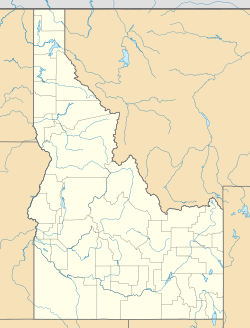Granite Pass (California Trail) facts for kids
Quick facts for kids |
|
|
Granite Pass
|
|
| Location | Southwest of Oakley, less than 0.5 miles north of the Utah boundary |
|---|---|
| Nearest city | Oakley, Idaho |
| Area | 160 acres (65 ha) |
| NRHP reference No. | 72000439 |
| Added to NRHP | June 28, 1972 |
Granite Pass is a historic spot in Cassia County, Idaho. It's a mountain pass that was a very important part of the California Trail. This trail helped many early American settlers travel west in wagons. They were hoping to find new homes and opportunities, especially in California. Granite Pass is located less than half a mile north of the Utah border.
Contents
What Was the California Trail?
The California Trail was a famous wagon route in the 1800s. It stretched for about 2,000 miles across the western United States. Thousands of pioneers, often called emigrants, used this trail. They traveled in large groups with their wagons, animals, and belongings. Their goal was to reach California, a land that promised new beginnings.
Many people started their journey on the Oregon Trail. The California Trail was a branch of this longer route. It split off and headed southwest. Travelers faced many challenges on their journey. These included harsh weather, difficult terrain, and limited supplies.
Why Did People Travel West?
People decided to move west for many reasons. Some wanted to find new farmland. Others hoped to discover gold, especially after the California Gold Rush began in 1848. Many also sought a healthier climate or simply a chance for a fresh start. The idea of "Manifest Destiny" also played a role. This was a belief that Americans were meant to expand across the continent.
Joseph Chiles and the Discovery of Granite Pass
Granite Pass gained its historical importance thanks to a man named Joseph Chiles. In 1842, Chiles was part of the Bartleson–Bidwell Party. This was one of the first groups trying to travel with wagons from Missouri to California. They were exploring new paths to make the journey easier.
Chiles and a small group separated from the main party. They were returning east towards Fort Hall, a well-known trading post. During this trip, Chiles discovered Granite Pass. He realized it would be a good route for wagons heading west. The pass could be seen from far away, making it a clear landmark for travelers.
How Granite Pass Became a Key Route
In 1843, Joseph Chiles led a group of wagons through Granite Pass. This made it an official part of the California Trail. From then on, many emigrants used this pass. Chiles himself guided seven different groups through it.
When the pass was first used for wagon travel, this area was actually part of Mexico. This shows how much the map of North America changed over time. The establishment of Granite Pass as a route helped shape the history of westward expansion. It made the difficult journey to California a bit more manageable for thousands of pioneers.
Protecting This Historic Place
Today, Granite Pass is recognized for its important role in history. A 160-acre area around the pass was officially listed on the National Register of Historic Places in 1972. This listing helps protect the site. It ensures that this piece of American history is preserved for future generations.
The National Register of Historic Places is a list of places in the United States that are important to history. When a place is added to this list, it means it has special value. It helps people understand and appreciate the past.



